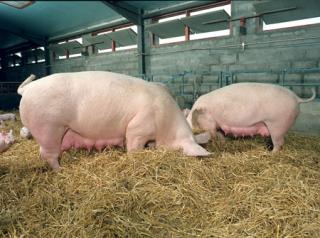Prenatal Stress In Pigs
Published on 30 March 2010 in Food, health and wellbeing

Introduction
Experimental studies in farm animals have clearly shown that early life experiences can have a substantial impact on outcomes of great relevance to later health, welfare and productivity. In particular, stress or under-nutrition experienced by the mother during pregnancy has been shown to have wide-ranging and important effects on how her offspring cope with their social, physical and infectious environment.
Studies examining such prenatal and transgenerational effects have been undertaken in pigs, sheep, cattle, poultry and fish and have shown that significant differences in health and welfare outcomes may occur due to conditions as early as conception. Variation in the conditions for development provided by the reproductive tract or egg, for instance by altered nutritional supply or hormonal milieu, may therefore explain a large degree of variation in many welfare and productivity relevant traits.
On-farm surveys of animal welfare often find substantial variation within particular farm production systems. Whilst epidemiological analyses of such data often allow many causal explanatory factors to be uncovered, these studies rarely investigate the role of the prenatal environment (as assessed by the housing and husbandry standards that applied to the dam) in determining welfare outcomes. However, decisions as to best practice for the housing and husbandry of pregnant animals, whether made by individual farmers, as part of farm assurance standards, or for the formation of legislative requirements should be informed by the possibility of transgenerational effects.
Key Points
- The impact of maternal stress during pregnancy on the offspring’s later health and welfare may be overlooked within some farming environments.
- The research work to date shows that a variety of negative welfare and productivity outcomes occur as a consequence of prenatal stress.
- Improvements in early life conditions could lead to improved farm animal welfare, increased farm productivity and efficiency, and higher quality, safer food products.
Research Undertaken
There are numerous possible ways in which stress or under-nutrition may be experienced by pregnant farm animals. Our current research (funded by the Scottish Government and BBSRC) has focussed on stress as a result of the aggression that inevitably occurs when unfamiliar adult female pigs are mixed together into new social groups. Such mixing during pregnancy may regularly occur in some housing systems, since in the UK sows are no longer housed individually in stalls during pregnancy.
To study these effects experimentally, gilts (primiparous sows) are mixed with older sows during the second third of their pregnancy for two one-week long periods. This mixing treatment, replicating poor quality commercial practice, is highly detrimental to gilt welfare, as shown by increased levels of stress hormones and body lesion scores, decreased growth rates and behavioural signs of submission. Offspring from mixed gilts are then compared to offspring from gilts that remained in stable social groups throughout their gestations. This research has demonstrated a number of effects that prenatal stress can have on progeny behaviour, health and welfare, including:
- Increased piglet responses to a painful event (tail-docking).
- A substantial growth check following weaning.
- Increased levels of social instability following weaning.
- Alterations to immune function including elevated levels of the acute phase protein Alpha-1-acid glycoprotein.
- Changes to key brain systems mediating stress responses (Corticotrophin-Releasing-Hormone (CRH) mRNA expression in the hypothalamus and amygdala, CRH1 and CRH2 receptor mRNA expression in the amygdala) and consequentially, increased stress reactivity.
- Impairments to maternal behaviour and an increased likelihood of piglet-directed aggression (savaging).
Such effects are not only damaging to pig welfare, they also represent possible economic costs to individual pig farmers through production inefficiencies.
Policy Implications
The possible importance of welfare standards for gestating animals, not merely for their own welfare, but for the welfare of the next generation they ‘house’ is widely unappreciated within most farming systems. The research conducted to date on pigs provides an example of how variation in early life experiences could play a substantial, yet currently hidden, role in determining how well farm animals cope with their environment and as such could be a major contributor to poor welfare outcomes (e.g. undesirable behaviours, stress reactivity, disease susceptibility) on many farms. Similar outcomes have been seen in other livestock species. Information on early life effects will be useful for individual farmers, for those setting farm assurance standards, for scientists conducting on-farm welfare research, and for policy makers and legislators.
Author
Dr Kenny Rutherford kenny.rutherford@sac.ac.uk







